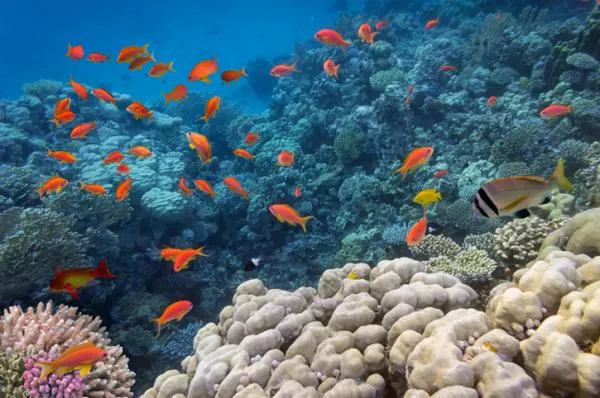
Ecological imbalance is a serious problem that, unfortunately, many of the ecosystems suffer. Without going any further, climate change is causing changes in global temperature, which affects the regulation of all ecosystems.
If you want to know what is ecological imbalance, its causes, consequences and examplesWe invite you to continue reading on Ecologist Verde.
What is biodiversity and ecological balance
Before we can understand ecological imbalance, we must know what are biodiversity and ecological balance.
What is biodiversity or biological diversity
Biodiversity is defined as the diversity of species that live in a given space. There are several aspects that affect biodiversity, but we can name a few: the quality of the environment, the diversity of climatic and geological zones that our study area encompasses, and the geographical conditions that allow or not the exchange with other ecosystems (for For example, isolated areas such as islands or peninsulas, such as the Iberian Peninsula, are reservoirs of biodiversity, since isolation favors the adaptation and evolution of species).
Species do not live alone in their environment, but establish many and very diverse relationships both with other species (biotic factors) and with the natural environment (abiotic factors). They can be trophic relationships, symbiosis or commensalism, competitive, space occupation, etc. In any case, the escosystems are constituted as a profuse network of relationships between all these elements. These relationships, moreover, always tend to be cyclical: thus, we find the water cycle, the nitrogen cycle, etc. Dual relationships, such as predator-prey relationships, are often studied. But let's not forget that these are always framed in a broader cycle.
What is ecological balance
Well, this is where we find the ecological balance, which we can define as the balance resulting from the regulation of the different cycles and networks in the ecosystem. Each of the elements of the ecosystem is influenced by several factors, which are more or less lax. In our predator-prey relationships, predators regulate the prey population, and these in turn regulate both the predator population and the amount of plant biomass.

What is ecological imbalance
For it to occur ecological imbalance There must be two important factors: on the one hand, there must be a external disturbance to the environment, either of natural origin (for example a burial) or anthropic (pollution, exploitation of resources, etc). On the other hand, that disturbance must exceed the regulatory capacity of the ecosystem, which will depend directly on the resilience or adaptation capacity that the affected elements have towards the external agent.
Looking at the example of predator-prey relationships, humans can introduce a new factor into the equation: hunting. If we hunt, two possible scenarios can arise: the first is that the predator population of our hypothetical ecosystem can regenerate itself. This is perfectly possible, since species always reproduce above the levels that an ecosystem can maintain. Thus, simply the "gaps" that we leave will be filled by new individuals. The balance is maintained.
In a second scenario, we would be hunting above what the predator population is capable of assuming: for many new individuals that are generated, the population decreases. By decreasing the predator population, the number of prey would increase exponentially, which in turn would cause significant damage to the vegetation cover. The vegetation cover is, in many cases, responsible for holding the soil. Without vegetation cover, erosion occurs, with the corresponding impoverishment of the soil, which will no longer be able to support life as it was until then. This has generated a clear ecological imbalance and a serious environmental problem.

Ecological imbalance: causes
Although the causes are potentially as multiple as there are factors that affect the ecosystem, we are going to explore some significant examples of causes of ecological imbalance:
- Overexploitation of resources: hunting, water extraction, mineral extraction, overexploitation of the soil … in this case we are "stealing" important elements that regulate cycles. Here you can learn more about the Overexploitation of natural resources: causes and consequences.
- Contamination with organic matter: a paradigmatic example is eutrophication, in which too much organic matter, for example detergents, is added to a basin of water. As a consequence, bacteria grow exponentially, consuming enormous amounts of the oxygen present in the water. Other species, such as fish, amphibians or nematodes, die from this radical decrease in oxygen. Eventually the bacteria also die, leaving a deeply contaminated pool of water.
- Inorganic pollutants: for example, it is the case of discharges to water. When a critical level is exceeded, the different "purification" strategies of organisms fail, and biodiversity is affected.
- Territory management: This point, often forgotten, is of vital importance. In order to have healthy populations, it is necessary to promote not only the absence of external agents, but also well-connected populations and ecosystems.
Ecological imbalance: consequences
As we have seen, the problem with imbalance is that it can affect all components of the ecosystem; therefore, the consequences of ecological imbalance depend on factors and severity. They should always be studied from a holistic point of view.
We remind you of some of the consequences already explained: erosion, desertification, eutrophication, deregulation of populations …

Examples of ecological imbalance
These are some simple examples of ecological imbalance.
- Deregulation of populations.
- Serious contamination.
- Fragmentation of the territory.
- Natural disasters.
In this other post by Green Ecologist you can know several Examples of natural disasters.
How to avoid ecological imbalance
The ecological imbalance should be avoided by adequate policies and plans for the preservation of the environmentSince so many factors influence it, it is difficult for us to act well individually.
You can expand this information in this other article on What is environmental management. In addition, we recommend you to know some ideas to contribute your grain of sand with this other post on How to take care of the environment.

If you want to read more articles similar to Ecological imbalance: what is it, causes, consequences and examples, we recommend that you enter our category of Other ecology.


